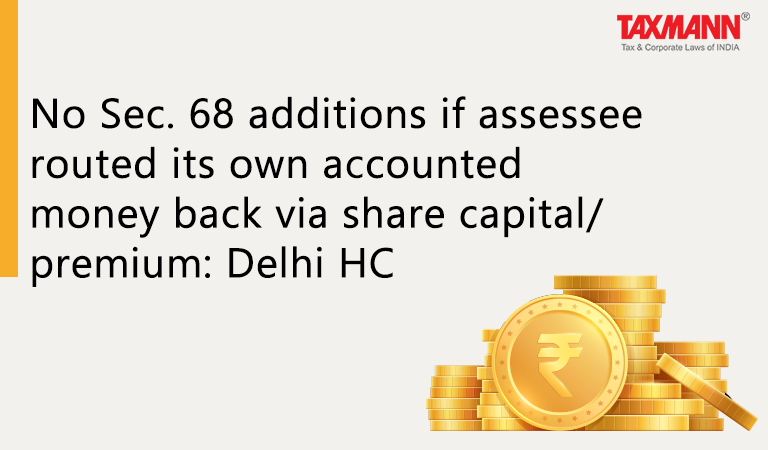No Sec. 68 additions if assessee routed its own accounted money back via share capital/premium: Delhi HC
- Blog|News|Income Tax|
- 2 Min Read
- By Taxmann
- |
- Last Updated on 27 January, 2022

Case Details: PCIT v. Agson Global (P.) Ltd. - [2022] 134 taxmann.com 256 (Delhi))
Judiciary and Counsel Details
-
- Rajiv Shakdher and Talwant Singh, JJ.
- Ajit Sharma, Sr. Standing Counsel for the Appellant.
- Mukul Rohatgi, Sandeep Sethi, Mahesh Agarawal, Rishi Agrawala, Karan Luthra, Sameer Rohatgi and Ankit Banati, Advs. for the Respondent.
Facts of the Case
During the assessment, the Assessing Officer (AO) made additions under section 68 on account of unexplained share capital and share premium.
The assessee contended that the monies invested in the company were its own money, which had been advanced to the investor entities, who, in turn, had invested the same in the assessee in the form of share capital/share premium.
Further, all transactions were carried out via banking channel and involved money, which was accounted for in the assessee’s books of accounts. Thus, the additions made under section 68 was incorrect. The Tribunal deleted the disallowance made by AO. Aggrieved-AO filed the instant appeal before the Delhi High Court.
High Court Held
The Delhi High Court held that the provisions of section 68 were not attracted when assessee-company routed its own accounted money back to itself, through other entities, as share capital/premium.
AO cannot make any additions under section 68. The assessee loans its funds to other entities that then invest it back in the assessee company as share capital unless the funds so routed back are unaccounted money.
As long as there was no material on record that established that unaccounted money (i.e., income generated which was not recorded in the books of account) had been funnelled in the form of investment by way of share capital/share premium, it could not be made the basis for making addition under Section 68.
Disclaimer: The content/information published on the website is only for general information of the user and shall not be construed as legal advice. While the Taxmann has exercised reasonable efforts to ensure the veracity of information/content published, Taxmann shall be under no liability in any manner whatsoever for incorrect information, if any.

Taxmann Publications has a dedicated in-house Research & Editorial Team. This team consists of a team of Chartered Accountants, Company Secretaries, and Lawyers. This team works under the guidance and supervision of editor-in-chief Mr Rakesh Bhargava.
The Research and Editorial Team is responsible for developing reliable and accurate content for the readers. The team follows the six-sigma approach to achieve the benchmark of zero error in its publications and research platforms. The team ensures that the following publication guidelines are thoroughly followed while developing the content:
- The statutory material is obtained only from the authorized and reliable sources
- All the latest developments in the judicial and legislative fields are covered
- Prepare the analytical write-ups on current, controversial, and important issues to help the readers to understand the concept and its implications
- Every content published by Taxmann is complete, accurate and lucid
- All evidence-based statements are supported with proper reference to Section, Circular No., Notification No. or citations
- The golden rules of grammar, style and consistency are thoroughly followed
- Font and size that’s easy to read and remain consistent across all imprint and digital publications are applied



 CA | CS | CMA
CA | CS | CMA
